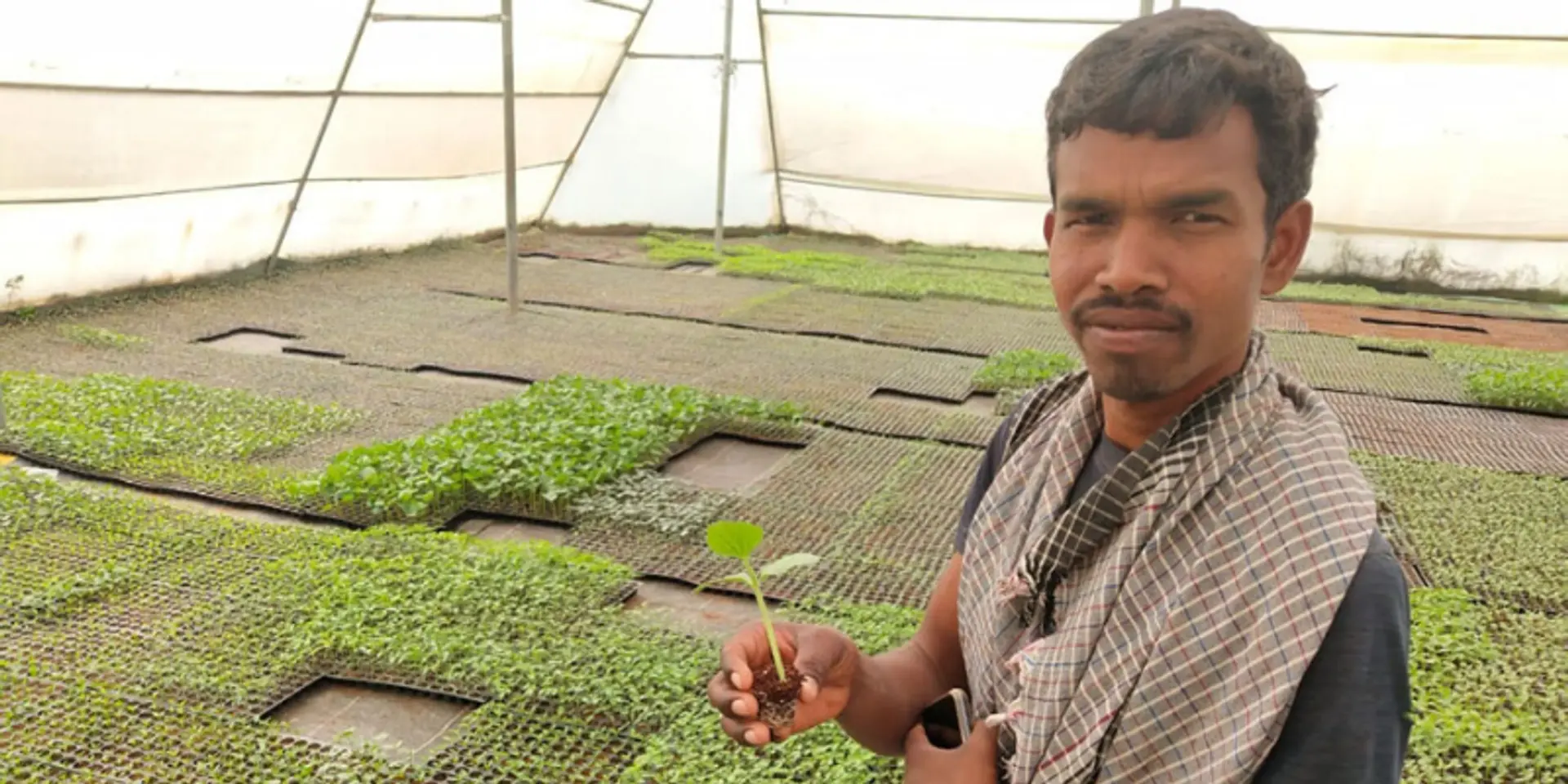How Jharkhand’s tribal farmers are increasing their farm-based income
Farmers in the central Indian tribal belt have adopted various farm-based livelihoods successfully, through Lakhpati Kisan – a programme that helps boost their income in a sustainable manner
Rajendra Tudu, a Santhal tribal farmer of Nagdi village in Churchu administrative block of Hazaribag district in Jharkhand, is a new generation agri-entrepreneur. Besides practising farming, he also runs a nursery on his small piece of land.

Raising saplings in a polyhouse nursery has made Rajendra Tudu a successful agripreneur, besides ensuring a steady supply of saplings to farmers (Photo by Jyoti Kanitkar)
We learnt about him and his work by chance. On our way to visit Oria village in the same district, we came across a board on the roadside. It had ‘Mission 2020: Lakhpati Kisan – Smart Villages’ written on it, with Rajendra Tudu’s name and picture.
Our curiosity took us to his nursery, and what we observed was truly inspiring. Rajendra not only raised a nursery from the ground up, but also gave hope to many fellow tribal farmers.
He had been working in the nursery that he had nurtured over the last three years. There were workers engaged in daily chores, a representative of a seed company on a business visit, and a few customers.

Women of the household and extended family help with the daily works such as washing coco peat (Photo by Jyoti Kanitkar)
Income enhancement programme
Initial contacts with professionals of Society for Upliftment of People with People’s Organisation & Rural Technology (SUPPORT) and subsequent interaction with a team from Collectives for Integrated Livelihood Initiatives (CInI) facilitated Rajendra’s dream of becoming an entrepreneur.
The teams, in partnership with other organizations and the government, were implementing Lakhpati Kisan, a programme to improve the livelihood of one lakh tribal farmers and help them earn Rs 1 lakh per annum. The programme is being implemented in Jharkhand, Odisha, Maharashtra and Gujarat.
Nursery business
Rajendra has studied up to class seven. However, his journey so far has proved that formal education and schooling has nothing to do with success and achievements in life.
He began by building a greenhouse for preparing saplings in the nursery and to sell them to local farmers. The attempt did not succeed. When the saplings did not survive, he realised that even a greenhouse cannot help in maintaining a uniform temperature during the peak summer months.
Guidance from SUPPORT and CInI teams, exposure visits, and training boosted his confidence to raise a nursery of vegetable plants. However, the 16m x 18m polyhouse nursery required an investment of Rs 1.20 lakh.

Rajendra Tudu, whose success has spawned more agripreneurs, raises saplings of water melon, bottle gourd and the like (Photo by Jyoti Kanitkar)
Rajendra decided to take a leap of faith. Half of the required amount of Rs 3 lakh was a grant from the CInI-Tata Trusts programme. He took out Rs 30,000 from his savings and received the remaining Rs 1.20 lakh as a loan from Rang De.
In our interactions, Rajendra proudly mentions that he cleared the three-year loan of Rs 1.20 lakhs (Rs 1.45 lakh repayment with interest) in two-and-a-half years!
Business savvy
Rajendra possesses all the knowledge about his business, which is currently in the third year of its functioning. With 102 saplings in each plastic tray, the nursery bed has a capacity to raise one lakh saplings in each cycle. In kharif (winter) season, he can have five cycles of saplings grown from seeds. He raises saplings like cucumber (kheera), bitter gourd (karela), bottle gourd (louki), watermelon, pumpkin (kaddu) and so on.
Rajendra is finance savvy. He fixes the price of saplings depending on the vegetable type. For instance, for bitter gourd, it is Rs 5 per sapling because the vegetable fetches Rs 40 per kilogram in the market. For other vegetables, it is Rs 1.25. Assuming he can raise 5,00,000 plants in kharif and another 1,00,000 in rabi (summer), his annual sales revenue could be between Rs 6 and 10 lakh.
He told us that the profit percentage is 50. More than 10 members from his family and neighbourhood, most being his extended family, are working in the business. The work is intensive, especially in preparing the plastic trays that use coco peat instead of soil. He purchases coco peat from Ranchi. Female members of the household help in cleaning the coco peat before use.
Lakhpati farmer
When we walked into Nagdi village unannounced, Rajendra was interacting with some customers who had come to buy 3,000 saplings. We asked him his plans for the future and the nature of competition.

The board about the Lakhpati Kisan program, with agripreneur Rajendra Tudu's polyhouse nursery in the background
“Yes, after seeing my success, three or four polyhouses for vegetable nursery plants have come about,” he said. “There is no competition. When I don’t have certain vegetable varieties, I direct my customers to them. They do the same. We exchange notes on difficulties that we face in raising saplings.”
Rajendra requested CInI to help him build another polyhouse nearby to increase his capacity. However, CInI didn’t agree. “They said that I should let some other person start this business in another locality, and that I should help him.” Now that’s what Rajendra is doing.
With agriculture in India contributing to 17 percent of the country’s GDP and employing around 60 percent of the workforce, the sector needs more people like Rajendra Tudu – an entrepreneurial ‘lakhpati kisan’ in the true sense.
(Edited by Kanishk Singh)
Disclaimer: This article was first published in VillageSquare.in. The views expressed by the author are his/her own and do not necessarily reflect that of YourStory.







